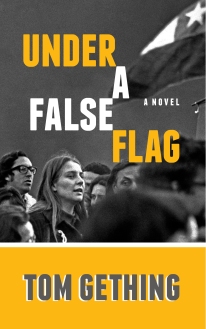 I had never heard of Ma Jian until I read his story, “The Woman and the Blue Sky,” in the Paris Review in 2005. As soon as I finished it, I ordered the book it came from, Stick Out Your Tongue. But, for some reason, I didn’t get around to reading it until now.
I had never heard of Ma Jian until I read his story, “The Woman and the Blue Sky,” in the Paris Review in 2005. As soon as I finished it, I ordered the book it came from, Stick Out Your Tongue. But, for some reason, I didn’t get around to reading it until now.
Stick Out Your Tongue is a slim volume of five spare stories about Tibet. Originally published in Chinese in 1987, state censors denounced the collection as “a vulgar, obscene book that defames the image of our Tibetan compatriots.” They accused Ma Jian of being sex obsessed and greedy for money. “No one must be allowed to read this book. All copies…must be confiscated and destroyed immediately.” That demand only increased the book’s popularity on the black market, but it finished Ma Jian’s career as a writer in China.
As he explains in the afterward, he went into self-imposed exile. First in Hong Kong, then Germany, and finally the United Kingdom. What was the point of remaining in China if he could never again publish what he wrote?
Ma Jian traveled throughout Tibet in 1985, and these stories come from that experience. Already Tibet was changing under China’s control, but these stories describe a dirt poor society of nomadic shepherds, villagers, tribesmen and monks in the high mountain plateaus and grasslands far beyond Lhasa. The people preserve a deep reverence for traditions and a Buddhist sense of fate. There is a mystical, magical and often superstitious side to their logic and actions, but what emerges in every story is the brutality of life there and resignation toward death. Perhaps this is why the censors were troubled.
“The Woman and the Blue Sky,” for example, is a haunting story told in the first person. In a high mountain pass, a traveler stays the night with a Chinese soldier who lives alone guarding the military telephone line. The guard tells of his love for a Tibetan woman who has just died with her unborn child still inside her. The traveler gets to observe the sacred funeral rite for the young woman. With the calm detachment of a photographer, he describes how her two husbands, who are brothers, cut up the body to feed the scavenging birds until there is nothing left.
The powerful stories of Stick Out Your Tongue remind me of the best of Anton Chekhov and Juan Rulfo, who captured the harsh realities of Russian and Mexican peasants in historic moments of great societal change. Deceptively spare in style, these stories are complex and deeply moving. The translator, Flora Drew, has done an astounding job rendering them into beautiful English prose.






Anyone compared to Juan Rulfo gets my attention- will definitely be checking this book out!
Maybe not quite as exceptional as Rulfo, but darned good. Worth the two hours it takes to read. Let me know what you think, if you do read it.
I will definitely read it as I respect your taste so much- although it may be in a while as my ‘to be read’ pile of books is growing faster than I can read! I will let you know what I think though.
How I relate! I’m supposed to be reading Within a Budding Grove right now. 🙂
Where does time go! 😉
Ironic that the Chinese government would accuse anyone else of “defaming our Tibetan compatriots” when they have made so many contributions to that effort themselves. If China really cared about Tibet they would end their military and cultural occupation of that country.
.
Tom, how would you describe Ma Jian’s writing style? My general impression of modern Chinese writers (e.g. Ha Jin) is that they are minimalists.
Hi David, yes, the irony is there and I think Ma Jian was aware of it, based on his afterward. Curiously, while in Tibet, to earn some money, he said he painted propaganda billboards, at least for a brief while.
As to his style, it is certainly spare, so you might call it minimalist, but it has the feeling of reportage, at least the stories in the first person, which are four of the five. And in some ways the stories reminded me of Roberto Bolaño. There is a modern, more urban sensibility observing and doing the telling of these stories within stories, which creates interesting tensions.
You’ve sold this to me, it sounds absolutely wonderful, I could slacken on food consumption in order to pay for a copy of this book….
Great! Then I’ve done something good today! I hope you enjoy it as much as I did.
‘Red Dust’ is the most controversial book I’ve read on China. The art scene and the euphoria jarring with commitment and repression. It’s the nearest thing I found to describing the brutal wonder of the country. I’d forgotten all about Ma Jian; your recommendation on order already! Thanks Tom.
Thanks for your recommendation as well. I’ll look for it. China is a fascinating place. I first went there in 1985 when everyone was wearing blue or green Mao suits and riding bicycles, very few cars. How it has changed!
Don’t go back. I couldn’t wait to revisit after living there for a year, but, not only could I not find my way around the neighbourhood I’d lived in, I couldn’t grasp how quickly everything had moved on. If you remember the blue suits, it’d be too surreal to see everyone wearing Gucci now.